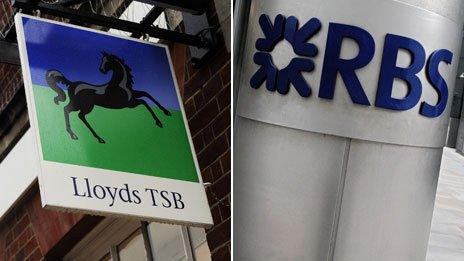No RBS or Lloyds sale till 2014
- Published
- comments

The privatisation of Royal Bank of Scotland (RBS) probably will not start till 2014, and for Lloyds the sale of the taxpayers' stake is not expected to begin until 2015. And even with that delay, taxpayers probably face big losses on the disposal of their shares.
When will taxpayers start to get any kind of a return from the semi-nationalisation of RBS and Lloyds, and how great will that return be?
Well, the timing of the privatisations is years away.
RBS's board is working on the assumption that the earliest that taxpayers could start to sell some of their 82% stake in the giant bank would be 2014.
As for Lloyds, it doesn't believe any of the 40% of its shares held by the Treasury will be sold till 2015.
Or to put it another way, there is a theoretical possibility that some of the government holdings in the two banks could be back in the private sector before the next election, due in 2015.
However, senior people at both banks say this possibility is only theoretical.
One RBS source tells me: "We want to give George Osborne the option of selling some of the shares in 2014 and we will prepare for that. But he may not want to sell then."
At Lloyds, the presumption is that it will be second in the privatisation queue. It believes the government wants to sell some of RBS first because with 82% of that bank's shares in taxpayers' mitts, RBS is too close to being fully nationalised for comfort.
"We assume we won't see any of our shares sold till 2015," says a Lloyds insider.
What about whether taxpayers stand a chance of getting their money back?
Slim-to-none, is the assessment of MPs on the Public Accounts Committee. , external
Their report,, external published today, on the Treasury's handling of the nationalisation and part-privatisation of Northern Rock, says:
"The £66bn cash spent purchasing shares in RBS and Lloyds may never be recovered."
Now in some ways that's just a statement of the arithmetically bloomin' obvious.
Lloyds' share price - at under 46p - is 38% below what taxpayers paid for their 40% stake. So the notional loss on the state's holding right now is just under £8bn.
As for RBS, its share price of 282p is 44% under the price paid by the Treasury. The paper loss is therefore a painful £20bn.
What goes down can bounce up again - but not for long or with much effect, if the falling body is the fabled dead cat.
What are the forces at work on RBS's and Lloyds' respective share prices?
Well, the cleaning up and reconstruction of both banks should be largely completed by the end of next year - and plainly, if the banks become conspicuously more efficient, they should be more valuable.
But the weights on the share prices are substantial. They include:
a) stagnation of the British and European economies;
b) the prospect of further losses on loans to zombie borrowers (businesses and households in "forbearance" on their debts);
c) restitution for the sins of the past (these include fines and damages relating to the Libor scandal, and compensation for PPI and swaps mis-selling).
And then there is the tension between the imperative of making the banks safer and maximising the short term value of the banks' existing equity or shares.
Or to put it another way, the more equity the banks are forced to hold as protection against losses, the less valuable - in the short term at least - the existing equity becomes.
That is because the existing equity would confer ownership rights over a smaller proportion of the existing assets, or because the need to conserve equity would reduce dividend payments to equity holders.
There is therefore an apparent paradox that minimising future losses to all of us from future banking crises, by forcing the banks to hold more capital, increases the net cost to taxpayers of the last crisis.
For example, Lloyds would like to resume paying dividends before it attempts to privatise any of the government's 40% holding.
But it cannot do that until it knows whether the European Union's Capital Requirements Directive 4 (CRD4) - which implements so-called Basel lll (stay with me) - will force it to hold additional equity.
So it will be next spring at the earliest, before Lloyds can have a meaningful negotiation with the Financial Services Authority (or rather by then, with the Bank of England, which is absorbing these prudential and supervisory responsibilities) on whether dividend payments can restart, because that is when CRD4 is now due to be published.
That implies Lloyds probably won't be able to start paying a dividend again till at least 2014 - and maybe even later.
But buying shares in a huge stagnant economy's biggest retail bank (Lloyds), when that bank doesn't even pay dividends, is not a desperately appealing prospect.
As taxpayers we should probably recognise rescuing Lloyds and RBS will never be seen as a free lunch, but it is turning into one of the longest most expensive lunches in history.